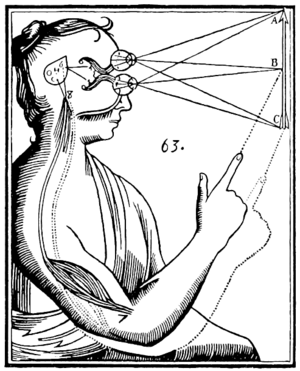Dualism facts for kids

Dualism is a big idea that means something is split into two main parts. These two parts are very different and separate. Think of it like a coin with two sides – heads and tails. You can't divide the coin in any other way.
If something can't be split at all, it's called monism. If it can be split into many parts, it's called pluralism.
In philosophy, which is about big questions and ideas, there are many kinds of dualism.
Contents
Mind and Body Dualism
One type of dualism is about the mind and the body. This idea says that your mind and your body are two very different things. Nothing that is part of your body can be part of your mind, and nothing from your mind can be part of your body.
Some people like this idea because they think the mind is too special or strange to be just a part of the body. Another idea is that the mind and body are actually the same thing. Or that "mind" is just another word for the brain. A famous thinker who talked about this was René Descartes.
Knowing the World (Epistemology)
Another type of dualism is about how we know the world around us. This idea says there's a barrier between you and the world. It splits the world into "myself" and "the world."
You can see, hear, taste, smell, and touch the world. But you can't know it directly. For example, you can't know just by looking that things are made of tiny atoms. This means something could happen in the world that you wouldn't know about because you couldn't sense it.
A different idea is that a person is just another part of the world. There is no barrier. For example, if you can't see, hear, taste, touch, or smell something, then it might not affect you at all.
Everyday Dualism
Dualism is also a common idea in everyday life. For example, it's a form of dualism to say that something is either hot or cold. Or that something is either good or bad. Or that something is either yours or someone else's. These ideas don't allow for any possible states in between, like "warm" or "a little bit good."
Ditheism: Two Gods
In theology, which is the study of religious beliefs, dualism can also mean ditheism. This is the belief that there are two separate powerful beings or principles. One is good, and the other is evil.
Some religions or beliefs that have ideas similar to ditheism include Zoroastrianism, Wicca, and Marcionism. Even though the Bible mentions Satan, this is not ditheism. This is because Satan is not equal to God. He is just an angel who went against God. (See Epistle of Jude, verse 6).
Ditheism is not exactly the same as general dualism, but they are similar. Ditheism means there are at least two gods. Moral dualism, on the other hand, doesn't necessarily mean there's a belief in any god at all.
See also

- In Spanish: Dualismo (desambiguación) para niños
 | Valerie Thomas |
 | Frederick McKinley Jones |
 | George Edward Alcorn Jr. |
 | Thomas Mensah |

